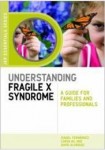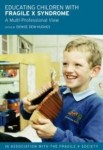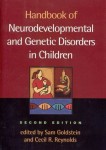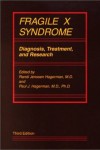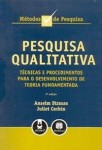Conteúdos restritos
Doutoramento
Conteúdos abertos
Aqui estão reunidas as informações sobre as referências bibliográficas recolhidas e utilizadas no projeto de investigação.
- Carvajal, I. F. & Aldridge, D. (2011). Understanding Fragile X Syndrome: A Guide for Families and Professionals. London: Jessica Kingsley Pub.
- Dew-Hughes, D. (2003). Educating Children with Fragile X Syndrome: A Multi-Professional View. New York: Routledge.
- Goldstein, S & Reynolds, C. R. (2011). Handbook of Neurodevelopmental and Genetic Disorders in Children. New York: Guilford Publications.
- Hagerman, R. J. & Hagerman P. J. (2002). Fragile X Syndrome: Diagnosis, Treatment, and Research. Baltimore, Maryland: The Johns Hopkins University Press.
- Bryant, A &Charmaz, K. (2007). The SAGE Handbook of Grounded Theory. London: SagePublications.
- Acesso a conteúdos restritos relativos à Grounded Theory.
- Corbin, J. & Strauss, A. (2007). Basics of Qualitative Research: Techniques and Procedures for Developing Grounded Theory.Thousands Oaks: Sage Publications.
- Corbin, J. & Strauss, A. (2007). Pesquisa Qualitativa – Técnicas e procedimentos para o desenvolvimento de teoria fundamentada. Porto Alegre: Artmed.
Referências Bibliográficas
Hatton, D. D., Wheeler, A., Sideris, J., Sullivan, K., Reichardt, A., Roberts, J., Clark, R., & Bailey, D. B. (2009). Developmental trajectories of young girls with fragile X syndrome. American Journal on Mental Retardation, 114(3), 161-171.Ornstein, P. A., Schaaf, J. M., Hooper, S., Hatton, D. D., Mirrett, P., & Bailey, D. B. (2009). The memory skills of boys with fragile X syndrome. American Journal on Mental Retardation, 113(6), 453-465.
Roberts, J.E., Mankowski, J.B., Sideris, J., Goldman, B.D., Hatton, D.D., Mirrett, P.L., Baranek, G.T., Reznick, J. S., Long, A. C. J., Bailey, D. B. Jr. (2009). Trajectories and predictors of the development of very young boys with fragile X syndrome. Journal of Pediatric Psychology, 4:827-36.
Bailey, D. B., Jr., Sideris, J., Roberts, J., & Hatton, D. (2008). Child and genetic variables associated with maternal adaptation to fragile X syndrome: A multidimensional analysis. American Journal of Medical Genetics, Part A, 146A, 720-729.
Baranek, G. T., Roberts, J. E., Fabian, D. J., Sideris, J., Mirrett, P. L., Hatton, D. D., & Bailey, D. B. (2008). Developmental trajectories and correlates of sensory processing in young boys with fragile X syndrome. Physical and Occupational Therapy in Pediatrics, 28(1), 79-98.
Hooper, S. R., Hatton, D., Sideris, J., Sullivan, K., Hammer, J., Schaaf, J., Mirrett, P., Ornstein, P., & Bailey, D. B. (2008). Executive functions in young males with fragile X syndrome in comparison to MA matched controls: Baseline findings from a longitudinal study. Neuropsychology, 22(1), 36-47.
Murphy, J., Hatton, D., Erickson, K. A. (2008). Exploring early literacy practices of teachers of infants, toddlers, and preschoolers with visual impairments. Journal of Visual Impairment & Blindness, 102(3), 133-146.
Shanahan, M. E., Roberts, J. E., Hatton, D. D., Reznick, J. S., & Goldsmith, H. H. (2008). Early temperament and negative reactivity in boys with fragile X syndrome. Journal of Intellectual Disability Research, 52(10), 842-854.
Roberts, J. E., Weisenfeld, L. A., Hatton, D. D., Heath, T. M., & Kaufmann, W. E. (2007). Social approach and autistic behavior in children with fragile X. Journal of Autism and Developmental Disorders , 37(9), 1748-1760.
Sullivan, K., Hatton, D., Hammer, J., Sideris, J., Hooper, S., Ornstein, P., Bailey, D. (2007). Sustained attention and response inhibition in boys with fragile X syndrome: Measures of continuous performance. American Journal of Medical Genetics, Part B, 10.1002/ajmg.b.30504.
Sullivan, K. M., Hooper, S. R., & Hatton, D. D. (2007). Behavioral equivalents of anxiety in children with fragile X syndrome: Parent and Teacher Report. Journal of Intellectual Disability Research, 51(1), 54-65.
Scarborough, A., Spiker, D., Mallik, S., Hebbeler, K., Bailey, D., & Simeonsson, R. J. (2004). A national look at children and families entering early intervention. Exceptional Children, 70 (4):469-483.
Roberts, J. E., Schaaf, J.M., Skinner, M., Wheeler, A., Hooper, S., Hatton, D .D., & et al. (2005). Academic skills of boys with fragile X syndrome: profiles and predictors. American Journal of Mental Retardation, 110 (2):107-120.
Hatton, D. D., Wheeler, A.C., Skinner, M.L., Bailey, D. B., Sullivan, K.M., Roberts, J.E., & et al. (2003). Adaptive behavior in children with fragile X syndrome. American Journal of Mental Retardation, 108 (6):373-390.
Sullivan, K., Hatton, D., Hammer, J., Sideris, J., Hooper, S., Ornstein, P., & et al. (Nov 2006). ADHD symptoms in children with FXS. American Journal of Medical Genetics. Part A, 140A (21):2275-2288.
Bailey, D. B. (2002). Are critical periods critical for early childhood education? The role of timing in early childhood pedagogy. Early Childhood Research Quarterly, 17 (3):281-294.
Hatton, D. D., Sideris, J., Skinner, M., Mankowski, J., Bailey, D. B., Roberts, J., & et al. (2006). Autistic behavior in children with fragile X syndrome: prevalence, stability, and the impact of FMRP. American Journal of Medical Genetics. Part A, 140 (17):1804-1813.
Bailey, D.B., Hatton, D. D., Skinner, M., & Mesibov, G. (Apr). Autistic behavior, FMR1 protein, and developmental trajectories in young males with fragile X syndrome. Journal of autism and developmental disorders, 31 (2):165-174.
Roberts, J. E., Boccia, M. L., Bailey, D. B., Hatton, D .D., & Skinner, M. (2001). Cardiovascular indices of physiological arousal in boys with fragile X syndrome. Developmental Psychobiology, 39 (2):107-123.
Bailey, D. B., Sideris, J., Roberts, J., & Hatton, D. (2008). Child and genetic variables associated with maternal adaptation to fragile X syndrome: a multidimensional analysis. American Journal of Medical Genetics. Part A, 146 (6):720-729.
Symons, F. J., Clark, R. D., Roberts, J. P., & Bailey, D. B. (J2001). Classroom behavoir of elementary school-age boys with fragile X syndrome. Journal of Special Education, 34 (4):194-202.
Bailey, D. B., Raspa, M., Olmsted, M., Holiday, D. B., Bailey, D. B., Raspa, M., & et al. (2008). Co-occurring conditions associated with FMR1 gene variations: findings from a national parent survey. American Journal of Medical Genetics. Part A, 146A (16):2060-2069.
Wheeler, A., Hatton, D., Reichardt, A., & Bailey, D. (2007). Correlates of maternal behaviours in mothers of children with fragile X syndrome. Journal of Intellectual Disability Research, 51 (6):447-462.
Roberts, J. E., Hatton, D. D., & Bailey, D. B. (2001). Development and behavior of male toddlers with Fragile X syndrome. Journal of Early Intervention, 24 (3):207-223.
Bailey, D. B., Skinner, D., Sparkman, K., Moore, C. A., Olney, R. S., & Crawford, D. C. (2002). Delayed Diagnosis of Fragile X Syndrome — United States, 1990–1999. Morbidity and Mortality Weekly Report, 51 (33):740-742.
Mirrett, P.L., Bailey, D. B., Roberts, J.E., & Hatton, D.D. (February 2004). Developmental screening and detection of developmental delays in infants and toddlers with fragile X syndrome. Journal of Developmental and Behavioral Pediatrics, 25 (1):21-27.
Baranek, G.T., Roberts, J.E., David, F.J., Sideris, J., Mirrett, P.L., Hatton, D.D., & et al. (2008). Developmental trajectories and correlates of sensory processing in young boys with fragile X syndrome. Physical & Occupational Therapy in Pediatrics, 28 (1):79-98.
Hatton, D.D., Wheeler, A., Sideris, J., Sullivan, K., Reichardt, A., Roberts, J., Clark, R., & et al. (May 2009). Developmental Trajectories of Young Girls With Fragile X Syndrome. American Journal on Intellectual and Developmental Disabilities, 114 (3):161-171.
Bailey, D.B., Skinner, D., & Sparkman, K.L. (2003 Feb). Discovering fragile X syndrome: family experiences and perceptions. Pediatrics, 111 (2):407-416.
Bailey, D.B., Hatton, D.D., Mesibov, G., Ament, N., & Skinner, M. (2000 Feb). Early development, temperament, and functional impairment in autism and fragile X syndrome. Journal of autism and developmental disorders, 30 (1):49-59.
Hatton, D.D., Bailey, D.B., Roberts, J., Skinner, M., Mayhew, L., Clark, R.D., & et al. (2000). Early intervention services for young boys with Fragile X syndrome. Journal of Early Intervention, 23 (4):235-251.
Ouyang, L., Grosse, S., Raspa, M., & Bailey, D. (2010). Employment impact and financial burden for families of children with fragile X syndrome: findings from the National Fragile X Survey. Journal of Intellectual Disability Research, 54 (10):918-928.
Bailey, D.B., Skinner, D., Davis, A.M., Whitmarsh, I., & Powell, C. (2008 Mar). Ethical, legal, and social concerns about expanded newborn screening: fragile X syndrome as a prototype for emerging issues. Pediatrics, 121 (3):e693-e704.
Hooper, S.R., Hatton, D., Sideris, J., Sullivan, K., Hammer, J., Schaaf, J., Mirrett, P., Ornstein, P.A., & et al. (Jan 2008). Executive functions in young males fragile X syndrome in comparison to mental age-matched with controls: Baseline findings from a longitudinal study. Neuropsychology, 22 (1):36-47.
Hartley, S.L., Seltzer, M.M., Raspa, M., Olmstead, M., Bishop, E., & Bailey, D.B. (2011). Exploring the Adult Life of Men and Women With Fragile X Syndrome: Results From a National Survey. American Journal on Intellectual and Developmental Disabilities, 116 (1):16-35.
Bailey, D.B., Skinner, D., Hatton, D., & Roberts, J. (2000 Oct). Family experiences and factors associated with the diagnosis of fragile X syndrome. Journal of Developmental and Behavioral Pediatrics, 21 (5):315-321.
Bailey, D.B., Raspa, M., Holiday, D., Bishop, E., & Olmsted, M. (Jul 2009). Functional skills of individuals with Fragile X Syndrome: A lifespan cross-sectional analysis. American Journal on Intellectual and Developmental Disabilities, 114 (4):289-303.
Skinner, M., Hooper, S., Hatton, D.D., Roberts, J., Mirrett, P., Schaaf, J., Sullivan, K., Wheeler, A., & et al. (2005 Jan 1). Mapping nonverbal IQ in young boys with fragile X syndrome. American Journal of Medical Genetics. Part A, 132 (1):25-32.
Bailey, D. (2010). Modeling family adaptation to fragile X syndrome. Journal of Applied Research in Intellectual Disabilities, 23 (5):459-459.
Bailey, D. B., Nelson, L., Hebbeler, K., & Spiker, D. (2007). Modeling the impact of formal and informal supports for young children with disabilities and their families. Pediatrics, 120 (4):e992-1001.
Bailey, D. (2010 Sep). Newborn screening for fragile X syndrome (FX): issues and initial results from a pilot study. Journal of Applied Research in Intellectual Disabilities, 23 (5):448-448.
Bailey, D.B., Raspa, M., Bishop, E., & Holiday, D. (Aug 2009). No change in the age of diagnosis for Fragile X Syndrome: Findings from a national parent survey. Pediatrics, 124 (2):527-533.
Raspa, M., Bailey, D.B., Bishop, E., Holiday, D., & Olmsted, M. (2010). Obesity, food selectivity, and physical activity in individuals With Fragile X Syndrome. American Journal on Intellectual and Developmental Disabilities, 115 (6):482-495.
Skinner, D., Choudhury, S., Sideris, J., Guarda, S., Buansi, A., Roche, M., & et al. (2011). Parents’ Decisions to Screen Newborns for FMR1 Gene Expansions in a Pilot Research Project. Pediatrics, 127 (6):E1455-E1463.
Kemper, A. R., & Bailey, D. B. (2009). Pediatricians’ knowledge of and attitudes toward fragile X syndrome screening. Academic Pediatrics, 9 (2):114-117.
Kemper, A.R., & Bailey, D.B. (2009). Pediatricians’ knowledge of and attitudes toward fragile X syndrome screening. Academic Pediatrics, 9 (2):114-117.
Wheeler, A. C., Skinner, D. G., & Bailey, D. B. (2008). Perceived quality of life in mothers of children with fragile X syndrome. American Journal of Mental Retardation, 113 (3):159-177.
Kronk, R., Bishop, E.E., Raspa, M., Bickel, J.O., Mandel, D.A., & Bailey, D.B. (2010). Prevalence, Nature, and Correlates of Sleep Problems Among Children with Fragile X Syndrome Based on a Large Scale Parent Survey. Sleep, 33 (5):679-687.
Hatton, D. D., Hooper, S. R., Bailey, D. B., Skinner, M. L., Sullivan, K. M., & Wheeler, A. (2002). Problem behavior in boys with fragile X syndrome. American Journal of Medical Genetics, 108 (2):105-116.
Skinner, D., Sparkman, K. L., & Bailey, D. B. (2003). Screening for Fragile X Syndrome: parent attitudes and perspectives. Genetics in Medicine, 5 (5):378-384.
Berry-Kravis, E., Raspa, M., Loggin-Hester, L., Bishop, E., Holiday, D., & Bailey, D. B. (2010). Seizures in Fragile X Syndrome: Characteristics and comorbid diagnoses. American Journal on Intellectual and Developmental Disabilities, 115 (6):461-472.
Symons, F.J., Byiers, B.J., Raspa, M., Bishop, E., & Bailey, D.B. (2010). Self-injurious behavior and Fragile X Syndrome: Findings from the National Fragile X Survey. American Journal on Intellectual and Developmental Disabilities, 115 (6):473-481.
Symons, F.J., Clark, R.D., Hatton, D.D., Skinner, M., & Bailey, D.B. (2003). Self-injurious behavior in young boys with fragile X syndrome. American Journal of Medical Genetics. Part A, 118 (2):115-121.
Sullivan, K., Hatton, D.D., Hammer, J., Sideris, J., Hooper, S., Ornstein, P.A., & et al. (Jun 2007). Sustained attention and response inhibition in boys with fragile X syndrome: Measures of continuous performance. American Journal of Medical Genetics. Part B, Neuropsychiatric Genetics, 144B (4):517-532.
Roberts, J. E., Mankowski, J. B., Sideris, J., Goldman, B. D., Hatton, D. D., Mirrett, P. L., Baranek, G. T., Reznick, S., Long, A. C. J., & et al. (2009). Trajectories and predictors of the development of very young boys with Fragile X Syndrome. Journal of Pediatric Psychology, 34 (8):827-836.
Bailey, D. B., Raspa, M., & Olmsted, M. (2010). Using a parent survey to advance knowledge about the nature and consequences of Fragile X Syndrome. American Journal on Intellectual and Developmental Disabilities, 115 (6):447-460.
Bailey, D. B., Hatton, D. D., Tassone, F., Skinner, M., & Taylor, A.K. (2001). Variability in FMRP and early development in males with fragile X syndrome. American Journal of Mental Retardation, 106 (1):16-27.
Baker, S., Hooper, S., Skinner, M., Hatton, D., Schaaf, J., Ornstein, P., & et al. (2011). Working memory subsystems and task complexity in young boys with Fragile X syndrome. J Intellect Disabil Res , 55 (1):19-29.
Block, S. S., Brusca-Vega, R., Pizzi, W. J., Berry-Kravis, E., Maino, D. M., & Treitman, T. M. (2000). Cognitive and visual processing skills and their relationship to mutation size in full and premutation female fragile X carriers. Optometry and Vision Science, 77, 592–599.
Dyer-Frieman, J., Glaser, B., Hessl, D., Johnston,C., Huffman, L. C., Taylor, A., Wisbek, J., & Reiss, A. L. (2002). Genetic and environmental influences on the cognitive outcomes of children with fragile X syndrome. Journal of the American Academy of Child and Adolescent Psychiatry, 41, 237–244.



